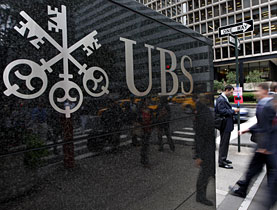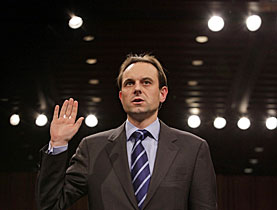Diplomacy could triumph in Swiss-US tax row

A diplomatic solution to the ongoing row between Switzerland and the United States over tax evasion is a distinct prospect, according to a US tax expert.
US pressure on Switzerland and leading Swiss bank UBS shows no signs of abating, but Washington D.C.-based lawyer Scott Michel told swissinfo that many Americans value the system of banking secrecy.
UBS is currently in a showdown with the US over alleged tax fraud by American tax dodgers. Last month the US Department of Justice deferred criminal prosecution of the bank provided that it complied with an impending court decision on the release of confidential data of 52,000 clients to the Internal Revenue Service (IRS).
The IRS and a special Senate committee appear determined to stop Switzerland hiding tax cheats, but Michel believes that the decisive battle will be fought out among politicians rather than lawyers.
Some UBS client records have already been handed over along with $780 million (SFr915 million) in fines, while Switzerland has hinted that it may start to recognise tax evasion as a crime.
swissinfo: Can the IRS really force the release of information on 52,000 UBS clients?
Scott Michel: There are two significant pieces of leverage that the IRS still has over the bank. The terms of the deferred prosecution agreement allows UBS to defend itself against the summons. But if the case results in a ruling against UBS and the bank fails to comply, the Department of Justice could revoke the agreement and indict UBS [with criminal charges].
In addition, if UBS fails to comply with a court order then a district court could impose significant contempt of court sanctions in the nature of a substantial fine on a daily basis until it complies with the order.
swissinfo: So the IRS will carry on until it gets these names?
S.M.: I compare the IRS to a dog chasing a fire truck – what is it going to do when it catches it? It cannot open 52,000 tax examinations at once.
The IRS understands that there are limitations on what they could do if they got hold of this information and that might encourage them to conduct some kind of negotiated disposition. I do think there is the prospect of some kind of diplomatic resolution that both sides could walk away from, claiming a win.
swissinfo: A political solution rather than a legal one?
S.M.: One could foresee a resolution whereby there is some kind of additional disclosure that lets UBS notify its customers in advance to enable them to undertake voluntary disclosures before their names are handed over.
Switzerland could also re-examine the distinction between tax evasion and fraud and broaden the tax information exchange treaty. You could see a combination of diplomatic factors that might avoid the need of protracted litigation and sanctions.
swissinfo: How have American UBS clients reacted?
S.M.: Many account holders are finding it difficult to sleep at night and are contacting tax professionals to commence the voluntary disclosure process. We also have a number of clients with accounts in other banks in Switzerland who see the UBS case as the thin end of the wedge to erode Swiss bank secrecy in general.
swissinfo: Does the US simply want to destroy banking secrecy?
S.M.: I would hope that the adults in the room would appreciate that there are a number of reasons why people would want to keep their financial information confidential besides attempting to evade taxes.
A number of my clients have accounts that grew out of the holocaust era. These are elderly people who were concerned that what happened in Europe could happen again. We also represent their children and grandchildren who were brought into the process as a result of these concerns. There is an historical and emotional connection to the secrecy of these accounts.
swissinfo-interview: Matthew Allen
People wishing to dodge paying taxes on their assets can do so by three means: avoidance, evasion and fraud.
Avoidance is the legitimate means of structuring finances so they don’t fall under the scope of taxable assets. This can be done, for example, by setting up a trust fund or by changing country residence or nationality.
Evasion is the deliberate concealing the true state of assets from the tax authorities – in other words, lying about the extent of your assets. This is a civil offence in Switzerland and some other countries, such as Austria and Liechtenstein, but criminal in most states.
The main distinction between evasion and fraud is that the perpetrator tells lies on official documentation. Unless tax fraud can be proved, Swiss banks are not obliged to hand over details of client assets to investigators. In some cases this information is needed before fraud can be established in the first place.
The newly designated chairman of UBS, Kasper Villiger, told newspapers on Sunday that he hopes that the bank will not need a second government bailout package.
UBS accepted a SFr6 billion ($5.2 billion) state deal last year. This did, however, not prevent the bank from posting a SFr20 billion loss for 2008 in February, the highest ever for a Swiss group.
In response to a question on whether more aid would be necessary, Villiger told the Sonntagszeitung newspaper, “we hope very strongly that this will not be the case”.
UBS announced Villiger’s nomination last Wednesday, one week after the appointment of former Credit Suisse head Oswald Grubel as its new CEO.
Villiger added that UBS would continue to do business in the US, despite the tax row.
He also said that Swiss banking secrecy was not sacrosanct. “Banking secrecy is important for Swiss banks but is not the only and most important factor for success anymore,” Villiger said.

In compliance with the JTI standards
More: SWI swissinfo.ch certified by the Journalism Trust Initiative












You can find an overview of ongoing debates with our journalists here . Please join us!
If you want to start a conversation about a topic raised in this article or want to report factual errors, email us at english@swissinfo.ch.